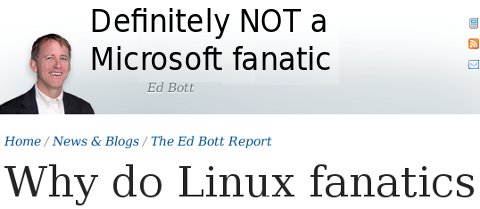

THE SUBJECT of UEFI was covered here before [1, 2, 3, 4, 5, 6] and we provided antitrust material to show that, based on history, Microsoft does many such things deliberately in order to impede competition (while planning to market everything to the public as a "feature", even DRM). Over the past few weeks, Microsoft boosters (with a proven history of sheer bias) have been trying to daemonise those who complain about UEFI and here is an example of a site that took the bait although it also wrote: "On that reading, Microsoft is spitting in the eye of their own customer base and it occurs to me that Microsoft’s secure boot would also prevent Windows users from using recovery and diagnostic software too (though frankly, I can’t muster much sympathy for people who pay for the privilege of being persistently shafted. They’re being digitally bitch slapped.) Even people who do not use GNU/Linux (or even proselytize for it) will have spotted straight away that European anti-trust laws forbids abuse of market dominance in one area to obtain it elsewhere. Already Linux Australia is considering petitioning the Australian Competition and Consumer Commission (ACCC) on the basis that it is anti-competitive. OEMs will be in the picture too if they lock down secure booting (even if under duress from Microsoft). Cartels aren’t popular. Or legal. It has even be mooted, that “hacking” the UEFI may even breach the DMCA."
Secure Boot Problems for Linux Users Are Here Already
More disturbing news on the UEFI/Secure Boot situation. Evidently, we don’t have to wait until the release of Windows 8 to find GRUB locked out of the boot sector on new computers. On Monday, Benjamin Kerensa reported on his blog that he’d received the following email regarded a failed attempt to install Linux on an HP PC:“Recent articles regarding UEFI and Windows 8 suggest the problem of the former blocking Linux bootloader installation is a matter that will appear at the introduction of the latter. That is not the case. It is on Win 7 machines and blocking GRUB installation now.Kerensa says that he’s looked further into this issue and has found that UEFI is already in use on some Dell and HP laptops. Evidently the folks over at Ubuntu are already aware of this problem and have posted some possible workarounds.
“My friend recently got an HP s5-1110 with Win 7 installed. UEFI has prevented the installation of GRUB on this machine. I could find no way in the BIOS to disable the feature and so far, as I work my way up the HP tech support ladder, I have found no HP techs who have a clue what I’m talking about.”
We need to make a lot of noise about this issue to convince the OEMs it would be to their advantage to take a position on this that doesn’t only benefit Microsoft.
Microsoft abuse of dominant position
[...]
Certainly the software giant from Redmond, Washington, has invested huge capitals in research and development of desktop software, but it is quite arguable that that alone could justify such a prominence in the market. Network effects can lead a company to dominate over its competitors, especially when there is a time advantage in reaching a market (for instance, see [17]). However it is well documented that Microsoft Windows gained at least part of its overwhelming market share through unlawful practices.
Microsoft has been accused of abusing its dominant position multiple times, both in Europe and elsewhere, resulting in some of the highest fines ever handed out by any court[18]. In 1993-1994, following a complaint by Novell Inc., Microsoft was found guilty of anti-competitive behaviour by requiring manufacturers to pay a Windows license for each computer sold, regardless of whether or not it carried Windows on board[1]. In 1998 Sun Microsystems argued that Microsoft was not disclosing key information needed to achieve interoperability of Windows NT with concurrent systems and programs. Following this complaint, the EU further investigated the way in which streaming technologies were being integrated in Windows[14].
In 2003 the European Union ordered Microsoft to offer a version of Windows without Windows Media Player bundled to it, so as to open the market to competing media player software. In 2004 the European Commission stated that Microsoft’s practise “constitutes by its nature a very serious infringement” of European Treaties and added a fine for €497.2 million[6]. Additional sentences followed this decision due to Microsoft appeals and to its limited compliance to the 2004 sentence. These led the EC to fine Microsoft for €280.5 million in 2006[7] and €899 million in 2008[12].
--Sometimes attributed to Abraham Lincoln
Comments
Michael
2011-11-01 21:25:54
You whine when MS does not support security. And here you whine when they do.